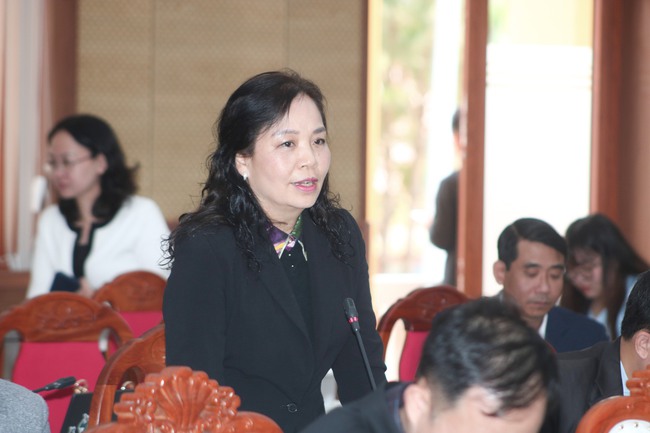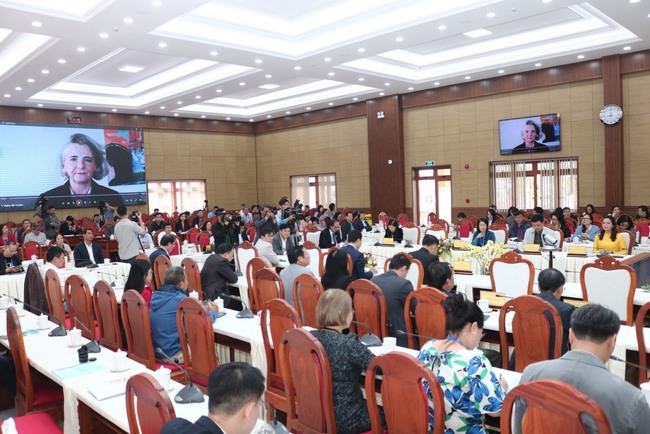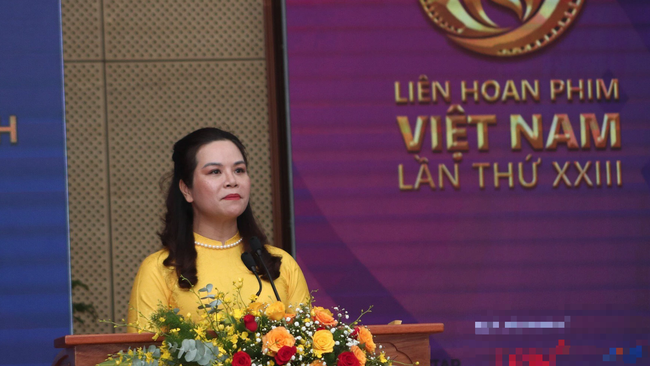With illegal streaming websites still rampant on the internet, do the authorities find it challenging to intervene?
In the context of the 23rd Vietnam Film Festival, a seminar on copyright protection in the development of the film industry addressed a pressing issue—illegal streaming websites.

Dr. Ngo Phuong Lan – President of the Vietnam Cinema Promotion and Development Association speaking at the seminar. Photo: Organizing Committee
Ts. Ngo Phuong Lan, President of the Vietnam Cinema Promotion and Development Association, affirmed to Dân Việt that, according to global statistics, Vietnam has one of the lowest awareness levels regarding copyrights in films and cinema. This is especially concerning given the continued existence of numerous illegal streaming websites. Phuong Lan pointed to the case in 2021, where the first criminal charges were filed against the pirate website phimmoi.com. However, the case remains unresolved.
Phimmoi.com is an illicit streaming website with servers located abroad, offering hundreds to thousands of pirated films for free. This has led to the proliferation of numerous other illegal websites, and so far, there hasn’t been sufficient measures or sanctions to deter them. Ts. Ngo Phuong Lan asserted that without effective copyright protection, the efforts of filmmakers, especially with illegal streaming websites still “invading” cyberspace, make it challenging for the Vietnamese film industry to thrive.

The seminar on Copyright Protection in the Development of the Film Industry involves the participation of numerous experts in the film and copyright sectors. Photo: Organizing Committee
Nguyen Ngoc Han, CEO of Thu Do Multimedia, expressed concerns about the involvement of betting websites behind these illicit streaming platforms, embedding advertisements and encouraging betting on pirated films.
Sharing her thoughts with Dân Việt, Phạm Thi Kim Oanh, Deputy Director of the Copyright Office (Ministry of Culture, Sports, and Tourism), believed that the rapid and overwhelming development of the Internet and technology is one of the main reasons. With just a smartphone, anyone can illegally livestream and swiftly upload content to social media platforms. Vo Thanh Hoa, a film director, concurred with this viewpoint, emphasizing the financial losses suffered by producers and filmmakers when their content is illicitly shared on platforms like TikTok. Many Vietnamese films released in the past year, such as ‘Con Nhot Mot Chong,’ ‘Sieu Lua Gap Sieu Lay,’ ‘Nha Ba Nu,’ and recently ‘Nguoi Vo Cuoi Cung,’ ‘Dat Rung Phuong Nam,’ have easily become subjects of unauthorized clips and improper edits on social media platforms.

Mrs. Pham Thi Kim Oanh, Deputy Head of the Copyright Office at the Seminar. Photo: Organizing Committee
Phạm Thi Kim Oanh asserted that, to effectively address the issue, besides continually refining legal documents and protecting the copyrights of cinematic works, there is a need to rapidly integrate information technology into management and the enforcement of copyrights. This also involves close collaboration with relevant foreign agencies to combat and address violations on the Internet and cyberspace.
Dr. Quang Van Minh, a lawyer and Deputy Chairman of the Vietnam Film and Television Copyright Protection Association, emphasized the necessity for practical and proactive measures. One such measure is to block ad revenue from illegal websites. He pointed out the practices of some countries, including the UK, where law enforcement agencies specializing in intellectual property crime have been established, collaborating closely with advertising platform providers on the internet.

Director Vo Thanh Hoa at the seminar. Photo: Organizing Committee (BTC).
Nguyen Ngoc Han suggested several technological measures, such as encryption for secure management, embedding copyright marks for content tracing when distributed to partners, granting viewing rights only to distribution units, not allowing copying rights, and automatically tracking revenue for distribution units. Currently, Han’s organization is implementing copyright protection using technology called Sigma Multi-DRM, which includes four security solutions: Play Ready, Widevine, Fairplay. Sigma DRM meets the standards agreed upon by most major copyright-holding companies globally for content distribution on the internet.
Han also added, ‘In addition to the general role like Multi-DRM in protecting content copyrights for devices with operating systems, the independent role of Sigma DRM is crucial in securing content for devices without operating systems. The number of these devices is expected to explode in the near future.’
Taking the example of the security camera sector, where currently, on average, each household has one camera, but in a few years, the country will have hundreds of millions of these devices, becoming the first sector with content that needs protection. The recent leaks of private clips underscore the open issues in security in this area. Another area is the Internet of Things (IoT) connected devices. Clearly, most current devices are connected and controlled through the cloud systems of foreign companies. When the country takes control of the development of IoT software and hardware, many layers of these devices requiring data exchange will need protection.”
Source: danviet.vn


Recent Comments